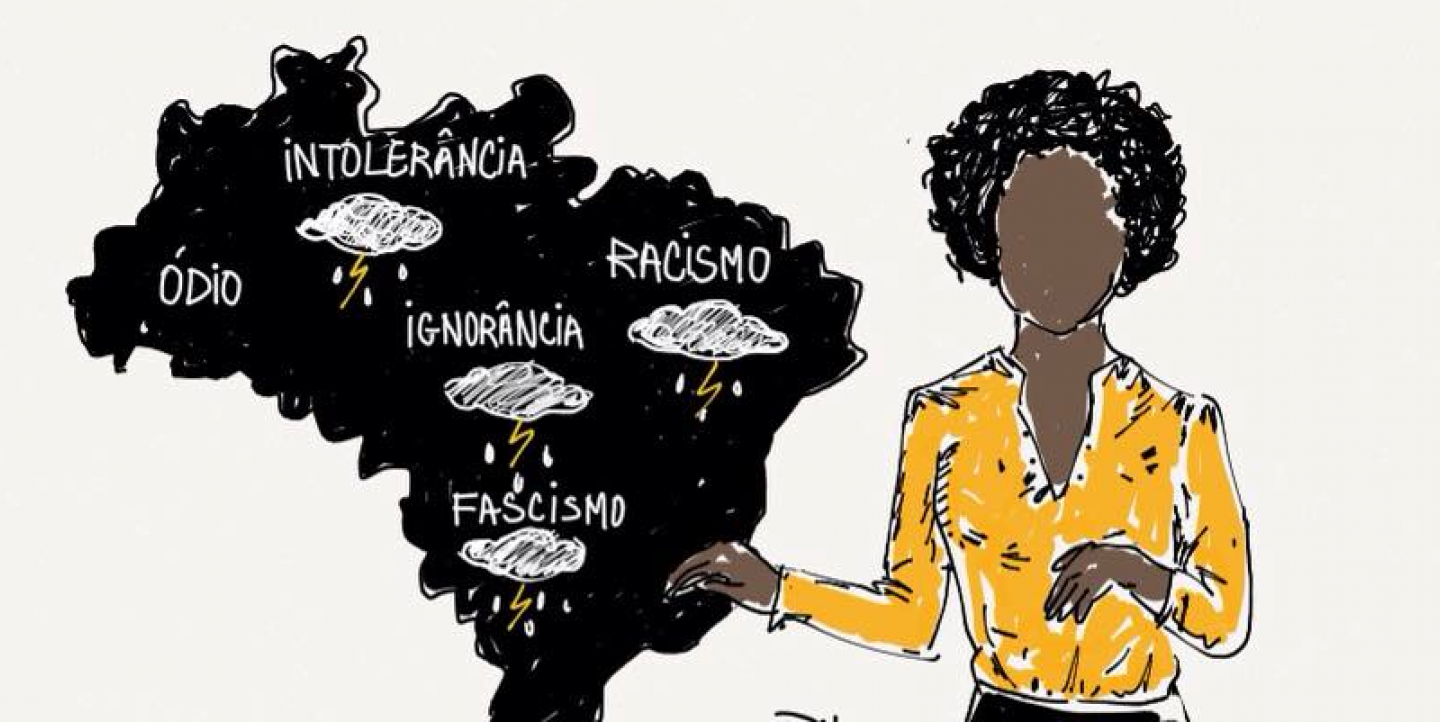Broadcast journalist Joyce Ribeiro experienced her first incident with digital racism 10 years ago. Back then, the Brazilian television anchor received a racist threat on a social network of her broadcast station.
But she remembers that experience more for what she didn’t do, than for what actually happened. She didn’t contact the police. She didn’t publicly condemn her attackers. And her television station colleagues didn’t rally around her.
“The first time I just let the racial attack pass by,” said Ribeiro, who anchors a morning news show on Sistema Brasileiro de Televisão (SBT), Brazil’s second most-watched television station. “Today I wouldn’t allow that to happen again that way.”
About 50 percent of Brazil's population is of African descent, along with a mix of European, Asian and indigenous populations. This diversity is rarely represented on the nation’s television news shows, giving Ribeiro a unique and rare presence in Brazilian broadcast journalism.
In November last year, Ribeiro experienced another racist attack through SBT's social media profile. But this time around, she contacted the police immediately. She also denounced the racist message on the fan page of her television station. The media even reported about her experience.
"My objective was to set an example for other people who are attacked online - that they need to contact the police and inform them,” Ribeiro told IJNet.
In early July, weather reporter Maria Júlia Coutinho, also known as Maju, experienced a racist attack on the Facebook page of Rede Globo Jornal Nacional. With her appointment in May, she became the first black weather reporter on Brazil’s most watched national television news show. When her photo was posted on the show’s Facebook page on a Thursday evening, several people posted racist comments, as if it were a coordinated attack.
On the following night’s newscast, the show’s anchor William Bonner stopped the broadcast to denounce the people who posted the racist comments. The digital public soon joined in to denounce the attack by collectively sharing tweets and Facebook posts with the hashtag #somostodosmaju, which became the country’s top trending hashtag on Twitter.
Since racism is a crime in Brazil, a police investigation was quickly initiated. The investigation identified a 15-year-old as a suspect.
Brazilian journalism’s latest public confrontation with racism shows that Ribeiro set an impressive example for others and that Brazilian society and media is evolving in the way it reacts to and manages public displays of racism.
Ribeiro says that the collective reaction of Rede Globo, Maju, the wider public and the police to the racist was perfect and illustrates something bigger happening in Brazil.
“This shows that things are slowly changing,” Ribeiro said. “This type of behavior shows that this is the beginning of the evolution of society.”
Public acts of racism against Brazil’s black journalists goes back even further than Ribeiro. Glória Maria, Brazil’s pioneering black broadcast journalist, experienced racism from the public throughout her 40-year career. She suffered the most racism from 1998 to 2007 when she worked on Fantástico, a popular news magazine show similar to 60 Minutes.
"This is proof of what I always say, that racism will never end. What (Maju) is going through, I lived through it on Fantástico. I received letters and afterwards, emails,” Maria told Época magazine. “There wasn’t a public declaration and it came directly to me, hurting my soul and heart. Today, it hurts Brazil. That’s the difference. I had to endure the lonely stride. What she is living through is normal in Brazil. But it never weakened me and I never gave up.”
But for the Brazil’s Federação Nacional dos Jornalistas, the country’s journalism trade organization, grand public reactions to isolated cases of racism is not enough—Brazilian media needs to do more to end racism in its news coverage, in the newsrooms and in society in general. The organization released a statement on July 16, urging journalists and media organizations to look at the bigger picture.
“Given these facts, we are publicly in solidarity with journalist Maria Júlia Coutinho, but also to all the journalists who have been racially discriminated against. The episode is not isolated. For the same reason, concern should be interpreted more broadly,” said the statement.
Eight journalism commissions that support racial equality in Brazil signed the statement.
Flávio Carrança, director of the Sindicato dos Jornalistas in the state of São Paulo and a coordinator of the Comissão de Jornalistas pela Igualdade Racial (Journalist Commission on Racial Equality), says that in general the country is paying more attention to racial issues.
“The theme of racism is more present in the media,” Carrança said. “Our country is battling with this question.”
Main image: Political cartoon of Maju used with permission from RIBS.

